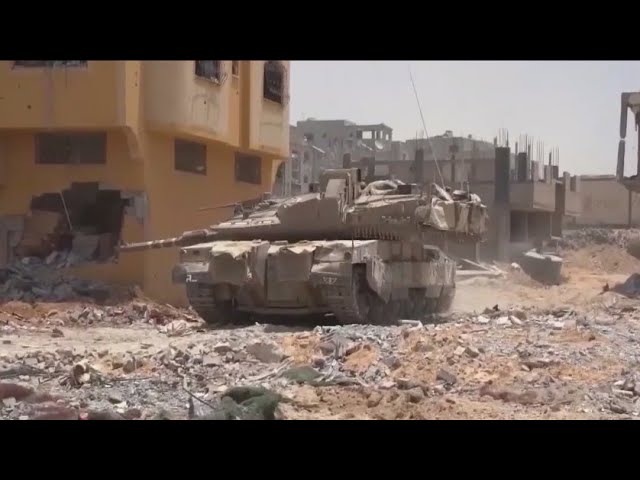IDF gains operational control of the Philadelphia corridor, intensifying the Rafah offensive and straining diplomatic ties
Israel now effectively controls Gaza’s entire land border after seizing the Philadelphi Corridor along the border with Egypt. This move risks straining Israel’s relationship with Egypt. The Israeli Defense Forces (IDF) announced on Wednesday that they had achieved “operational” control over this 14-kilometer corridor, the only part of Gaza’s border with Egypt.
In a televised briefing, chief military spokesperson Daniel Hagari emphasized the significance of this action. “The Philadelphia Corridor served as an oxygen line for Hamas, which it regularly used to smuggle weapons into the area of the Gaza Strip,” Hagari stated. He added that troops had discovered approximately 20 tunnels in the region. An Israeli military official confirmed the presence of Israeli forces on the ground along parts of the corridor.
Egypt has contested these claims. State-linked Al-Qahera News reported a “high-level Egyptian source” denying the existence of tunnels on the Egyptian border with Gaza. “There is no truth to Israeli media reports of the existence of tunnels on the Egyptian border with Gaza,” the source said. “Israel is using these allegations to justify continuing the operation on the Palestinian city of Rafah and prolonging the war for political purposes.” Egypt has previously asserted that it has destroyed hundreds of cross-border tunnels since 2013.
The White House, however, sees Israel’s actions as consistent with the “limited” ground operations briefed to President Joe Biden’s team. White House national security spokesperson John Kirby explained, “When they briefed us on their plans for Rafah it did include moving along that corridor and out of the city proper to put pressure on Hamas in the city.”
The Philadelphia Corridor forms part of a larger demilitarized zone along the Israel-Egypt border. Under the peace accord, both countries can deploy only a minimal number of troops or border guards in this area. At the time of the accord, Israeli troops controlled Gaza.
This recent action follows an earlier diplomatic row between Israel and Egypt when the IDF seized control of the Rafah crossing. This move indicates a deepening of Israel’s offensive in southern Gaza and further threatens its relations with Egypt.
On Wednesday, Israel escalated its offensive in Rafah, deploying tanks on raids and advancing into the heart of the city. This defied an order from the top United Nations court to halt the assault immediately.
National security adviser Tzachi Hanegbi spoke to Kan public radio, predicting that the war with Hamas would likely extend through the end of the year. “The army is achieving its objectives but [it] said from the first days it was presenting its plan to the cabinet that the war will be long,” Hanegbi stated. “They have designated 2024 as a year of war.”
As Israel expands its operations in Gaza, the impact on the region’s stability and Israel’s diplomatic relations remains to be seen. The control over the Philadelphia Corridor marks a significant escalation, underscoring Israel’s commitment to its strategic objectives despite international calls for restraint.
Analysis:
Israel’s control over Gaza’s entire land border, particularly the Philadelphi Corridor, represents a significant shift in the region’s geopolitical landscape. This action not only intensifies the ongoing conflict in Gaza but also introduces new complications in Israel’s relationship with Egypt.
Politically, Israel’s seizure of the Philadelphia Corridor underscores its strategic focus on weakening Hamas. By controlling this buffer zone, Israel aims to cut off smuggling routes that have historically supplied Hamas with weapons. This move aligns with Israel’s broader objective of dismantling Hamas’ military capabilities. However, it also risks inflaming tensions with Egypt, a key regional player. Egypt’s denial of tunnel existence and its assertion that Israel is using these claims to prolong the conflict reflect a deepening mistrust between the two countries.
Sociologically, the situation in Gaza continues to deteriorate. The humanitarian impact of ongoing military operations exacerbates the already dire conditions faced by Gaza’s civilian population. This includes disruptions to daily life, loss of homes, and increasing casualties. The international community’s response to these conditions could influence the course of the conflict, potentially leading to increased pressure on Israel to halt its operations.
Economically, the control over Gaza’s border could further isolate the region. The restriction of smuggling routes, while aimed at curbing Hamas’ access to weapons, also impacts the flow of essential goods and services into Gaza. This economic stranglehold could worsen living conditions for Gazans, heightening the humanitarian crisis.
Locally, the reaction within Gaza and neighbouring areas will be critical. The population’s resilience is continuously tested, and the ongoing conflict fuels animosity and despair. The extent of local support for Hamas and other militant groups may shift based on the perceived success or failure of Israeli operations.
From a gender perspective, women and children in Gaza bear a disproportionate burden of the conflict. Displacement, loss of family members, and limited access to resources heighten their vulnerability. Addressing these specific challenges is crucial for any long-term resolution to the conflict.
For marginalized and minority communities, the conflict presents unique challenges. In Gaza, these groups often face compounded hardships due to their social and economic status. The intensification of military operations exacerbates these difficulties, calling for targeted humanitarian assistance.
Theoretically, the ongoing conflict highlights the limits of military solutions in addressing deeply rooted political and social issues. Israel’s control of the Philadelphi Corridor demonstrates a tactical success but poses questions about the broader strategic goals and their feasibility. The conflict’s persistence despite repeated military interventions suggests the need for comprehensive peacebuilding efforts that address underlying causes, including political disenfranchisement, economic deprivation, and social injustice.
In conclusion, Israel’s control over Gaza’s entire land border marks a pivotal moment in the ongoing conflict. The ramifications of this move extend beyond immediate military objectives, influencing regional diplomacy, humanitarian conditions, and the long-term prospects for peace. As the situation evolves, the international community’s engagement and the internal dynamics within Gaza will play crucial roles in shaping the conflict’s outcome.
